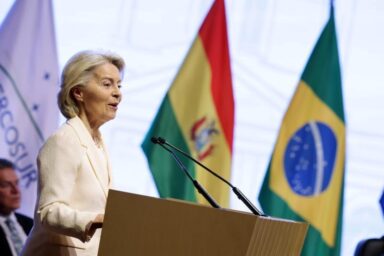France’s Prime Minister Sébastien Lecornu exited less than a day after taking office. The move intensified political uncertainty in one of the European Union’s founding and most influential members, a linchpin of the continent’s integration.
When Charles de Gaulle died in November 1970, then-President Georges Pompidou announced his passing with the memorable line “De Gaulle is dead. France is a widow.“ On Monday, an even darker message descended on the country: “Lecornu resigned. France is ungovernable.“
The response to the resignation of the 14-hours-old government of Sébastien Lecornu was quick. French stocks and the European currency fell while France’s borrowing costs jumped on Monday, wiping billions of euros off the stock market.
European repercussions
Paris’ $3tn CAC 40 index dropped more than 1.5 per cent, making it by far the worst-performing index in Europe. Shares in major lenders tumbled, leaving major banks BNP Paribas, Société Générale, and Crédit Agricole, down four to five per cent. The euro, which has weathered much of France’s political turmoil over the past year, slid 0.7 per cent for the day to $1.1665. “It’s concerning that the new cabinet only lasted 12 hours,” Danske Bank analyst Kirstine Kundby-Nielsen told Reuters (erroneously subtracting two precious hours from the shortest-lived modern French administration’s record).
In the past, caustic critics of French world-war defence efforts pointed out that capitulation appeared to be the most popular move among the country‘s military leaders. Lately, prime ministerial resignation seems to have assumed similarly privileged position on the home front.
You might be interested
More importantly, the Lecornu upheaval could have significant repercussions for the EU’s decision-making processes and policy agenda. It severely limits Emmanuel Macron’s manoeuvring space on the European stage, precisely at the moment when the French president is hoping to use his international clout to push through his country’s—as well as his own—priorities.
Resign? Moi?
In the face of adversity, Mr Macron has ruled out stepping down before the end of his term in 2027. Nonetheless, the repeated government collapses and parliamentary deadlock have eroded his domestic political capital, which could limit his capacity to push ambitious reforms at the EU level. His pro-integration stance remains crucial for maintaining France’s active role within the Union, but political fragility at home constrains his influence.
Mr Macron promotes deepening European defence cooperation, notably to support Ukraine and counter emerging imperialist pressures, and advancing joint debt issuance to finance Europe’s competitiveness and strategic projects.
Economic sovereignty and competitiveness are core themes. Mr Macron frequently points to a need to double investments in key sectors and underlines the Franco-German partnership as essential to driving reforms. This includes pushing for the integration of markets and harmonising regulations—from business law to bankruptcy rules—to enhance economic convergence and resilience.
Protecting European interests
On the digital front, Macron supports protecting European interests robustly in the face of competition and external dependence. He promotes digital sovereignty through coordinated public procurement and investment initiatives.
It’s concerning that the new cabinet only lasted 12 hours. — Kirstine Kundby-Nielsen, Danske Bank analyst
On migration and security, Mr Macron has been pushing for the uniform implementation of the European Pact on Asylum and Migration, and for managing the Schengen area strategically in order to ensure the smooth operation of internal borders. The French president has also frequently highlighted the importance of European diplomacy in the Middle East, urging resolution of the Israel-Gaza conflict and advocating political recognition of the Palestinian state at the European level. Next to that, he has favoured cautious engagement with Syria and renewed negotiations with Iran.
Mr Macron has also called for reforms to strengthen democracy, the rule of law, and the EU’s capacity to act both internally and externally. He supports preparing the EU for enlargement and managing geopolitical challenges through enhanced coordination amongst member states, including through new or revamped treaties reflecting shared ambitions.
Precarious position
France’s political instability follows a period of mounting fractiousness in the French National Assembly, where the government has struggled to secure parliamentary support, especially on austerity measures aimed at controlling public spending. The recent snap election produced a hung parliament, leaving prime ministers unable to pass crucial legislation. Mr Lecornu’s resignation comes against this backdrop of gridlock, with major political parties entrenched in opposing positions.
The political deadlock raises questions about continuity and coherence in France’s contributions to EU policy. Without a functioning government able to enact reforms or advance legislation, France’s influence in Council deliberations could be weakened. This may slow down or complicate consensus-building on key EU dossiers such as budgetary discipline, migration, climate policy, and digital regulation.
While Mr Macron remains committed to his mandate, the government’s fragility hampers France’s ability to champion and shape EU policy effectively. For Brussels and EU partners, managing the consequences of this turmoil will require patience, flexibility, and possibly greater German or other leadership in the near term.










